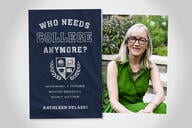You have /5 articles left.
Sign up for a free account or log in.
Amid continuing debate, and sometimes disagreement, about the value and wisdom of measuring student learning outcomes in higher education, a few areas of consensus are slowly emerging.
One is that faculty members are usually too little involved in setting their institutions' strategies for assessing student learning and in using the results of those efforts to change teaching and learning practices. Another is that without meaningful involvement by the faculty, efforts to assess student learning are close to meaningless.
Those dueling realities suggest a pretty big problem for what might be called the assessment "movement": If campus leaders can't figure out a way to more meaningfully involve faculty members in their institutions' efforts to gauge the quality and extent of learning, the campaign is likely never to take hold.
That problem is seemingly being engaged everywhere you turn these days. Patricia Hutchings confronts it in an essay published this spring by the National Institute for Learning Outcomes Assessment, in which she examines why many professors have often viewed the learning outcomes movement with suspicion, describes a slight change in the weather on that front, and suggests how higher education leaders might build on that progress. The paper follows a survey released last year by NILOA that found, among other things, that campus leaders considered involving faculty in assessment to be one of their greatest challenges.
And the same themes were all over the agenda at last month's meeting in Chicago of the Higher Learning Commission of the North Central Association of Colleges and Schools. The agenda featured a slew of sessions on the role of the faculty in assessment ("Developing Faculty Engagement in Teaching and Assessing General Education Outcomes," "Involving Faculty in Campus-wide General Education Assessment Strategies," "Regular Program Assessment by Motivated Faculty -- a Win-Win!"), and the role of the faculty came up in virtually every major discussion during the days-long meeting.
Assessment and Accountability
Hutchings's paper, "Opening Doors to Faculty Involvement in Assessment," cites several major reasons why faculty members have been slow to embrace the idea that measuring student learning is not only necessary, but actually in their best interests. Chief among them is the fact that while "assessment was seen first and foremost as an educational practice" in its early days, Hutchings notes, it has often been championed by politicians and others outside academe as a way to hold higher education accountable for its performance.
Given the fierce protectiveness with which people tend to view their professional responsibilities, that has often made assessment seem like a tool that could be used against professors, to prove that they're not doing a good job. Not surprisingly, that hasn't exactly encouraged them to get with the program. "From the faculty point of view, [assessment] looked a lot like someone else’s agenda -- and not an altogether friendly someone else, at that," Hutchings writes.
The language commonly associated with assessing student learning -- "accounting, testing, evaluation, measurement, benchmarking, and so forth" -- hasn't helped, drawn as it is from "business and education, not the most respected fields on most campuses," Hutchings writes. "[I]t is striking how quickly assessment can come to be seen as part of 'the management culture' rather than as a process at the heart of faculty's work and interactions with students."
The structure and rewards of faculty work, as they are currently set up, also make assessment a hard sell, Hutchings writes. Teaching in general is undervalued and rarely emphasized in graduate programs, and "reflecting on educational purposes, formulating learning goals, designing assessments and exams, and using data for improvement" are little examined in many faculty development programs, as well. And the tilt of many campus tenure and promotion systems favoring research over teaching and institutional service means that younger professors often have little incentive assessment to invest their time and energy in such activities -- habits that may be hard to break later on.
Lastly, but importantly, Hutchings argues, professors may look around and see assessment activity making relatively little difference on their campuses, making their reluctance to jump into the fray "a rational decision." "The fact remains that the benefits of assessment are uncertain and that faculty facing rising demands on their time and energy must make choices," she said.
Hutchings sees hope in some recent developments, notably the increasing breadth and quality of scholarship on teaching and learning, the slow but steady expansion of campus policies that reward teaching effectiveness, and the emergence of better tools to help colleges and instructors gauge their students' progress and learning. Her recommendations -- including building assessment activities directly into the "regular, ongoing work" of instructors and students in the classroom, more clearly recognizing assessment work as legitimate scholarship -- are designed to build on that progress.
Building From the Ground Up
The role of the faculty in furthering (or fighting) the assessment of student learning outcomes was a common topic at the Higher Learning Commission meeting, where national policy makers and rank and file faculty members alike seemed to agree that they were beginning to see increasing acceptance, if not exactly welcoming, of the need for professors to play a role in the right kind of assessment.
"We still haven't turned the corner in trying to engage the faculty the way we would want to," Peter T. Ewell, vice president of the National Center for Higher Education Management Systems and a founder of NILOA, said in a presentation at the accrediting meeting. There has been some progress, he said. "The English professor used to say, you can't do this. Now, the English professor is reluctantly saying, 'Yeah, it's got to be done.' But we're still not at the point of authentic faculty ownership."
That's because too much of the assessment rhetoric still focuses on institutional accountability rather than on the importance of working from the classroom level up to improve how, and how much, students learn, Molly Corbett Broad, president of the American Council on Education, told the Higher Learning Commission crowd. "If the chain of logic [behind learning outcomes assessment] begins from an accountability perspective, the focus is on the institution, and if it is primarily an institutional measure, it is potentially disconnected from how individual faculty members teach.
"Faculty must own [assessment] and live it in the context of each student," Broad said. "Because if faculty do not own outcomes assessment, there will be minimal impact on teaching and learning and, therefore, on student achievement," which is supposed to be the point, she said.
In one of the numerous sessions about engaging faculty meaningfully in assessment activities, officials from Blackburn College described their efforts in the 2008-9 academic year to "reframe assessment" in the wake of an earlier, largely failed initiative that had been seen by many professors there as "an external attempt at standardization and control," said Sam Meredith, a political scientist there who helped lead the effort. "We were hoping to move from a standardized test that we would get from outside to be used for reporting, to something that was an integral part of the teaching process," built on and integrated into a revision of the general education goals that the Illinois liberal arts college had just completed, Meredith said.
Blackburn officials used pressure from the college's accreditor, the Higher Learning Commission, as a "stick" that helped them argue that "there was a fairly firm mandate that we had to achieve," and that they were in a position to "design a process to achieve our own goals in a way that fufilled that mandate, too," he said.
The college's relatively small size ("Our faculty can get in a single room and look at each other," Meredith said) enhanced (but did not make easy) the process by which humanists and scientists and others came to agreement on a common set of goals for critical thinking, writing and multicultural understanding, creating "rubrics" for gauging when students had achieved those goals, and then building assignments designed to test the rubrics into each and every course.
The process is ongoing, and the college is just beginning to collect solid data to help it decide how to adjust its curriculum to improve students' mastery of the desired learning outcomes.
But Blackburn has already achieved its primary goal, said Provost Jeffery P. Aper, of helping faculty members to see assessment not as an "occupying force," but "as an organic part of their work."





